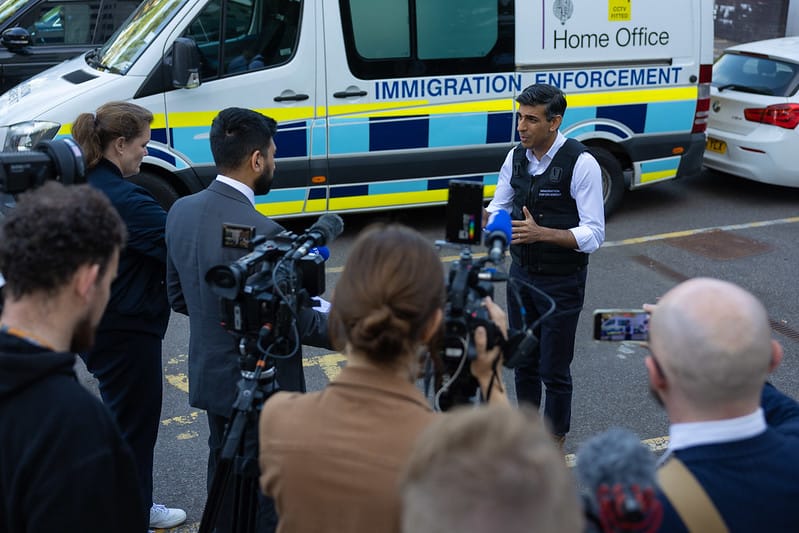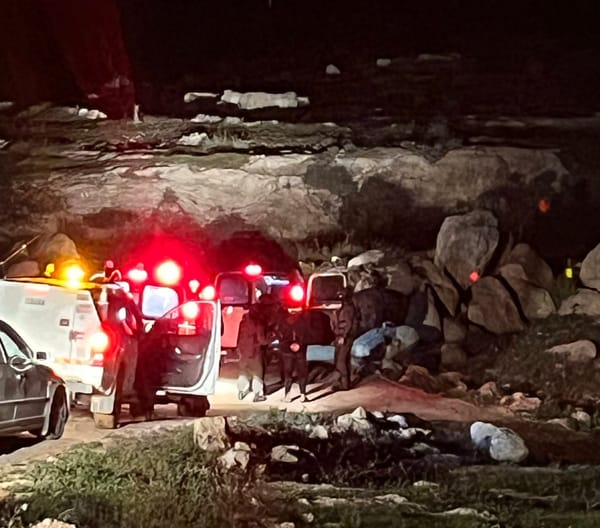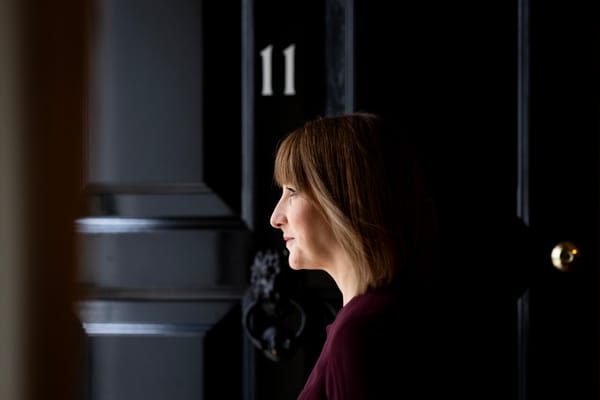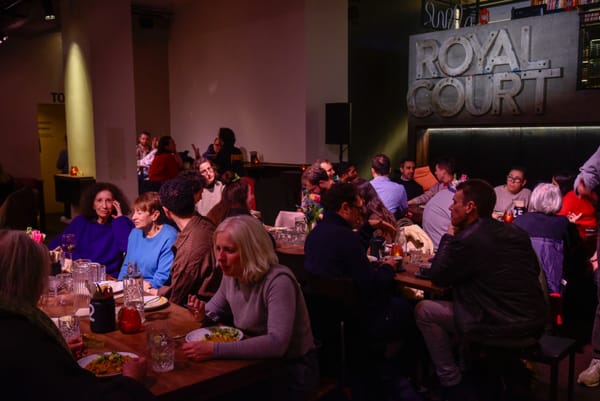‘People are really fired up and angry’: Resisting the Rwanda plan
Vashti speaks to activists fighting detentions, deportations, and the wider “hostile environment”.

This week, the government began a surprise operation to detain thousands of asylum seekers for eventual deportation to Rwanda. This decision came days after the UK’s Rwanda Bill passed in Parliament and received Royal Assent, thereby declaring Rwanda a “safe third country” in direct contradiction to the Supreme Court’s November 2023 judgement.
Reporting on Tuesday indicated that authorities have identified 5,700 asylum seekers for the first round of detentions, but have lost contact with over half of those selected. For those who have been detained, immigration solicitors maintain that individual detentions can still be challenged and are prioritising these cases in their very limited capacity. At the same time, activists across the country are resisting this policy by supporting asylum seekers outside reporting centres (where many asylum seekers must physically appear at regular intervals) and in their local communities. Yesterday, protestors in Peckham successfully stopped a bus from taking asylum seekers to detention on the Bibby Stockholm barge, leading to 45 arrests.
To better understand what’s happening, Vashti editor Evan Robins spoke to Jay* and Pea* from Action Against Detention and Deportations (AADD), a grassroots coalition of groups and individuals committed to ending detention, deportations, and the wider “hostile environment” against people on the move. AADD’s members include people seeking sanctuary in the UK, and some are at risk of being removed to Rwanda themselves.
This interview has been edited for length and clarity.
*The activists’ names have been changed to protect their identity.
How has the situation developed over the last week?
Jay: We learned over the weekend that the government had announced this mass detention operation and our idea was twofold. One was to go down to the reporting centres, focusing on the two London centres (Lunar House in Croydon and Eaton House in Hounslow), and ensure that people who are going to report had the information they needed should they get detained. That would mean giving them leaflets, speaking to them, recording whether they came out of the centre and then seeing what we could do in response if they didn't.
That has gone hand in hand with materially obstructing the operation of the detention infrastructure. It's been really hard to actually prevent people from being taken from the reporting centres to detention, because the size and the aggression of the police presence is quite hard to combat. Sometimes there are flashpoints where it's been possible to surround a van and delay it from leaving a reporting centre. Other times, because of low numbers, it's been quite difficult to do that. It kind of ebbs and flows.
Do you also sense an ebb and flow to how, when, and where Immigration Enforcement targets asylum seekers? Does it intensify at night?
Pea: In terms of the reporting centre, people go and report during opening hours and, at Lunar House for example, some of those who have been detained are held there until late at night [before being driven away to a detention centre]. That’s because of the people outside resisting. Of course, the situation differs from reporting centre to reporting centre and also depends on the number of people who are outside resisting [the removals], which is why it's so essential to have more people to be ready to interrupt that process.
J: People just don't know what's going to happen to them when they go and report. And it's not just reporting. There have been raids on people's accommodation as well. SOAS Detainee Support (SDS) was in contact with someone who went to report in Croydon, returned home, and was then raided and detained.
Four days in, it seems much still remains unclear about how this policy is being carried out.
J: Yes. There are criteria to determine which groups will be deported to Rwanda, but within that, it's really difficult to know who will be targeted. Some people might feel that they're safe because they've had an interview or they've filled out one of the asylum questionnaires that have been sent out over the last year, but that's not necessarily a guarantee against being detained.
P: We have also observed people being taken into detention at a police station [where they were reporting] at the same time as others were being detained at Lunar House. It's also hard to predict from where someone will be taken to detention.
What is the political context in which this detention policy emerged?
J: This has been the government’s flagship policy for the last two years, and it's clearly racist, punitive, and illegal. I think the government has a few aims. One is the cynical political gain of bolstering their support among right wing and racist voters. There's also their more strategic political opposition to their moral and international obligations and, as we've seen with its complicity in the genocide in Gaza, the government doesn't care at all about human rights or morality or international law, or any of those lofty concepts.
I think it's also part of a wider attack on the living conditions and the civic life of migrants in this country. On the one hand, you have attempts to make the lives of quote unquote legal migrants more precarious. On the other, there is the extreme cruelty of the Rwanda policy, the constant attacks on asylum seekers, and imprisoning people crossing the channel.
P: The Rwanda policy is the backbone of the Illegal Migration Act; without it [the act] doesn't really function. Considering, though, that many of the provisions of the Illegal Migration Act aren’t really in force, you do start questioning how likely it is that people will actually be removed to Rwanda.
At the same time, the government is using the [recent] voluntary departure to demonstrate that Rwanda is a safe country because asylum seekers are choosing to go there. In reality, this points to how they want to use the legitimacy of law to expand Britain's own imperialist policies – to use people who have come here as a result of British colonialism and current imperialism as pawns in a political game.
How do you make sense of this wave of detentions in terms of Britain’s long-term hostile environment policy? Do you see it as an expected progression of that process or a surprising escalation?
J: All of the infrastructure for the [detention] policy has been in place for a long time: the immigration raids, detention centres, charter deportation flights. None of that is new. I think it's an intensification in that the level of general fear and terror that it instils in asylum seeking communities is, I think, quite new and an intensification of previous trends.
We know from the first attempted flight in June 2022 that even being put into detention and threatened with deportation was enough to have a severely detrimental impact on the health and well-being of the people who are targeted, and that's going to happen again this time around. We also know what the consequences of this scheme will be if it is implemented successfully, even if it's only for a few people. Australia's policy of detaining and offshoring people, expelling people onto the Manus and Nauru Islands, has caused untold suffering. Israel had a similar arrangement with Rwanda and Uganda and thousands of people were deported to destitution and left in legal limbo.
P: It's an expansion of the hostile environment in a way that extracts from the global south even more and expands its detention estates across borders.
What kind of networks of resistance are responding to this moment? What kind of repression are they experiencing?
J: The networks that developed to resist and obstruct the first flight in 2022 have consolidated over the last two years and, in this present moment, are synergising with anti-raid, cop watch, and community monitoring networks to create a more responsive and flexible mobilisation against state violence.
This has all taken place in a context where people are already incredibly appalled at the perfidy of the British state because of its support for the genocide in Gaza. So I think people are really fired up and angry and part of that is being channelled into the resurrection of the Rwanda policy.
P: The BLM uprisings in 2020 started a wave of protests that we haven't seen in a very long time. Now, the Palestine solidarity protests have resulted in different networks responding to things together, building our collective capacity, which is resulting in this current level of mobilisation.
The repression tactics being used aren't new. A big way in which the repression at the moment is happening is through surveillance – not just by the police, but even some right-wing media has been attempting to get into certain Signal groups – successfully in some cases – and trying to leak information. You can see that with the Energy Embargo for Palestine protest. We have to constantly think about them as well as the police infiltrating the ways in which we mobilise.
Then there is the police violence at protests. Just today, 45 protestors were arrested trying to resist people being removed to the Bibby Stockholm. Over the past few months, you have seen increasing levels of arrest and violence. For example, police pepper spraying a relatively small protest run by the Dyke Project. We’re not surprised by the different modes of repression, and it’s something we’re collectively building knowledge on.
Finally, how can people get help?
J: There are some basic things, like getting connected to your local anti-raids group, responding to the call-outs for solidarity at reporting centres. You can also tap into the organising that's already going, because we always need more capacity, we always need more, more people to come out and speak to people, share information, block vans, block roads, and in the longer term, get involved in direct solidarity work supporting people facing the sharp end of border violence.
P: I agree about showing up to things. You don't need to be in a Signal group to know this is happening. This is all over social media and the BBC.
Apart from showing up to demonstrations, [it’s important] to constantly counter the government’s narrative and support the building of a new narrative around what's happening. Even if it was another country that wasn't Rwanda, this would still be a struggle because it's a struggle against the expansion of borders. ▼
Evan Robins is an editor at Vashti.




